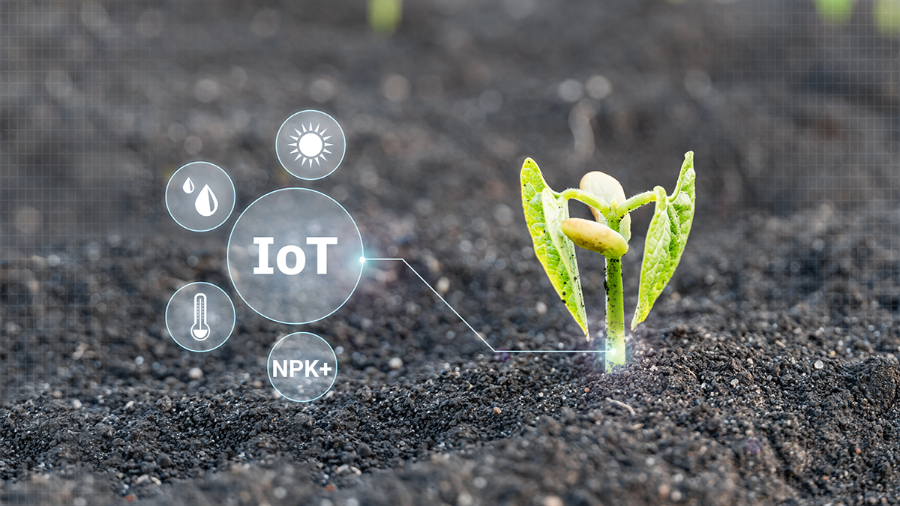Enhancing Soil Testing Through AI-IoT Integration
The agricultural sector heavily relies on effective soil testing to ensure optimal crop growth and sustainable farming practices. However, traditional soil testing methods often fall short due to their labor-intensive nature and time-consuming processes. This has spurred the exploration of innovative solutions, with the convergence of Artificial Intelligence (AI) and the Internet of Things (IoT) presenting a promising avenue for revolutionizing soil testing practices.
Challenges of Traditional Soil Testing
Traditional soil testing methods face inherent challenges, including the need for laborious processes and the delays associated with obtaining results. Moreover, these methods may not adequately capture the spatial and temporal variability of soil conditions across agricultural fields. Consequently, farmers may struggle to make timely and informed decisions regarding soil management practices, impacting crop yield and quality.
The Emergence of AI-IoT Machines
The integration of AI and IoT technologies offers a transformative approach to soil testing. AI algorithms, powered by machine learning, can analyze real-time data collected by IoT sensors deployed throughout agricultural fields. These sensors monitor critical soil parameters such as moisture levels, nutrient content, and pH levels, providing farmers with comprehensive insights into soil health and composition.
Revolutionizing Soil Testing
AI-IoT machines provide several advantages over traditional soil testing methods. They enable high-resolution data collection, allowing farmers to monitor soil conditions with unprecedented accuracy and detail. By identifying localized issues such as nutrient deficiencies or pH imbalances, farmers can implement targeted corrective actions, optimizing crop production and resource management practices.
Case Studies and Success Stories
Numerous case studies illustrate the effectiveness of AI-IoT machines in improving soil testing practices. For instance, farming cooperatives have reported significant enhancements in crop yields and soil health through the adoption of these technologies. Additionally, research institutions are leveraging AI-IoT machines to conduct innovative studies on soil biology and ecology, further advancing our understanding of soil ecosystems and their interactions with agricultural practices.
Overcoming Challenges and Adoption Barriers
Despite the promising benefits of AI-IoT machines, challenges remain in their widespread adoption. Initial investment costs and concerns regarding data privacy and security may deter some farmers from embracing these technologies. Moreover, integrating AI-IoT machines with existing agricultural practices requires education and outreach efforts to overcome resistance to technological change.
Future Directions and Potential Impact
Looking ahead, continued innovation in AI and IoT technologies holds the potential to further enhance soil testing practices. Advancements in machine learning algorithms and sensor technology will enable more sophisticated analysis and decision support systems. Moreover, expanding the application of AI-IoT machines beyond soil testing into other agricultural domains promises holistic farm management and sustainable food production.
Advancements in AI-IoT Technologies
Recent advancements in AI and IoT technologies have paved the way for significant improvements in soil testing practices. Machine learning algorithms, in particular, have become increasingly sophisticated, capable of analyzing vast amounts of soil data with unparalleled accuracy and efficiency. These algorithms can detect subtle patterns and correlations within the data, providing valuable insights into soil health and composition. Moreover, IoT sensors have undergone miniaturization, allowing for seamless integration into agricultural fields without disrupting existing farming practices. These sensors continuously monitor soil parameters in real-time, providing farmers with up-to-date information to inform their decision-making processes. Additionally, advancements in wireless connectivity have enabled seamless communication between IoT devices, central databases, and farm management systems, facilitating data collection, analysis, and dissemination. As AI and IoT technologies continue to evolve, the capabilities of AI-IoT machines in soil testing are expected to further expand, offering farmers unprecedented levels of precision and efficiency in managing soil health and optimizing crop production.
Integration Challenges and Solutions
While the integration of AI and IoT technologies holds immense promise for transforming soil testing practices, it is not without its challenges. One significant challenge is the compatibility of AI-IoT machines with existing agricultural practices and infrastructure. Farmers may face difficulties in incorporating these technologies into their operations, especially if they lack the necessary technical expertise or resources. Moreover, concerns regarding data privacy and security must be addressed to ensure the protection of sensitive agricultural data collected by IoT sensors. Farmers need assurance that their data will be securely stored and utilized for beneficial purposes only. Additionally, the scalability of AI-IoT solutions poses a challenge, particularly for small-scale farmers with limited financial resources. However, collaborative efforts between government agencies, research institutions, and technology providers can help overcome these challenges. By providing financial support, technical assistance, and training programs, stakeholders can facilitate the widespread adoption of AI-IoT machines in agriculture. Furthermore, initiatives to raise awareness and educate farmers about the benefits of AI-IoT technologies can help overcome resistance to change and promote a culture of innovation in the agricultural sector. Through collaboration and concerted efforts, the integration of AI and IoT technologies in soil testing has the potential to revolutionize agriculture, paving the way for more sustainable and efficient farming practices.
In conclusion, the integration of AI and IoT technologies offers a promising solution to the challenges faced by traditional soil testing methods. By providing farmers with real-time insights into soil health and composition, AI-IoT machines empower them to make informed decisions, optimize crop production, and enhance environmental sustainability. As adoption rates increase and technological advancements continue, AI-IoT integration in agriculture will undoubtedly drive positive transformation, shaping the future of farming for generations to come.
Source

